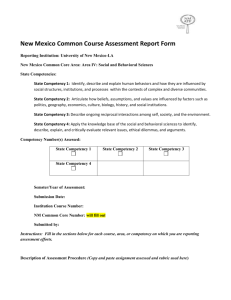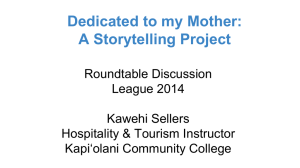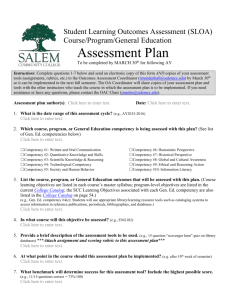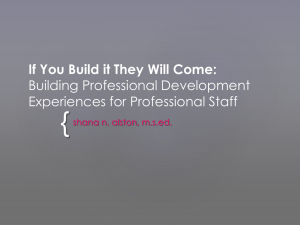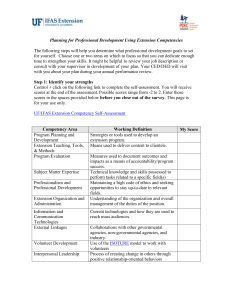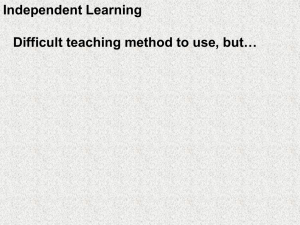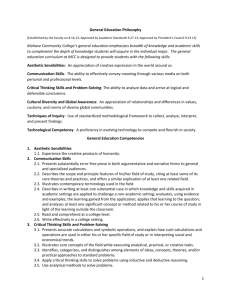General Education - Salem Community College
advertisement
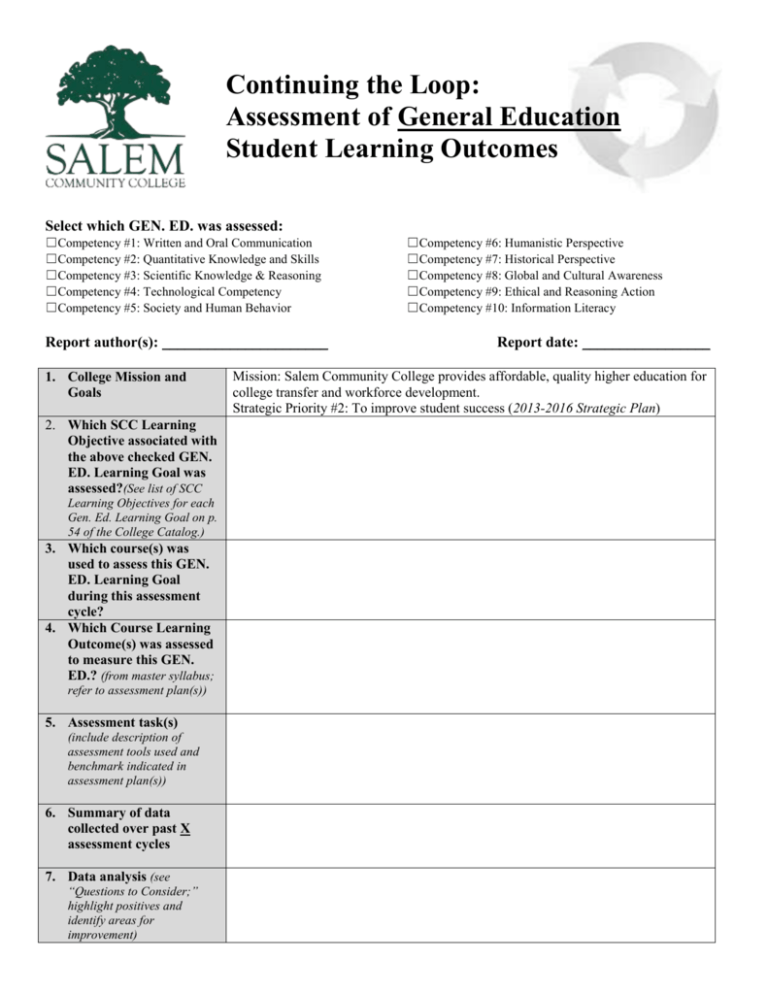
Continuing the Loop: Assessment of General Education Student Learning Outcomes Select which GEN. ED. was assessed: ☐Competency #1: Written and Oral Communication ☐Competency #2: Quantitative Knowledge and Skills ☐Competency #3: Scientific Knowledge & Reasoning ☐Competency #4: Technological Competency ☐Competency #5: Society and Human Behavior Report author(s): ______________________ 1. College Mission and Goals 2. Which SCC Learning Objective associated with the above checked GEN. ED. Learning Goal was assessed?(See list of SCC Learning Objectives for each Gen. Ed. Learning Goal on p. 54 of the College Catalog.) 3. Which course(s) was used to assess this GEN. ED. Learning Goal during this assessment cycle? 4. Which Course Learning Outcome(s) was assessed to measure this GEN. ED.? (from master syllabus; refer to assessment plan(s)) 5. Assessment task(s) (include description of assessment tools used and benchmark indicated in assessment plan(s)) 6. Summary of data collected over past X assessment cycles 7. Data analysis (see “Questions to Consider;” highlight positives and identify areas for improvement) ☐Competency #6: Humanistic Perspective ☐Competency #7: Historical Perspective ☐Competency #8: Global and Cultural Awareness ☐Competency #9: Ethical and Reasoning Action ☐Competency #10: Information Literacy Report date: _________________ Mission: Salem Community College provides affordable, quality higher education for college transfer and workforce development. Strategic Priority #2: To improve student success (2013-2016 Strategic Plan) 8. Changes planned or made based on data analysis (see “Questions to Consider;” be as specific as possible in identifying actionable items; please indicate if any of your recommendations have budgetary implications) 9. Continuing the Loop (review the actionable items submitted in previous annual reports; discuss what actions have been taken and their results) What professional development or resources could help you with future assessment activities? Resources about best assessment practices Samples of assignments, rubrics, assessment plans, and/or completed annual reports Workshops on assessment Additional notes/comments: One-on-one assistance from OAC Chair or Assessment Coordinator None at this time Other (list below) Questions to Consider Questions to consider when analyzing data: Are the results too high? Are the results too low? Are the results erratic? Are the results in the Goldilocks zone? (What is an “acceptable” range for the results?) Questions to consider if the results are too high, too low, or erratic: Course-Level 1. Do the program or course-level objectives need to be reworded? Sometimes what we initially thought we wanted from our students no longer works. 2. Do the assignment instructions need to be more clearly written? Did students understand the assignment the way you understand it? A few words here or there can make a huge difference. 3. Does the assignment need to be revised or updated? For example, are there questions on an exam that the vast majority of students always get right or wrong? 4. Do the grading tools need to be revised? This is especially true when you graded a weak paper, but the rubric score was really high. 5. Did you provide enough training of that skill before the students performed it? A few low-stakes primers before the assessment may be in order. 6. Do you need to offer students more opportunities for active learning? Perhaps a shorter lecture and more hands-on activities are needed. 7. Do you need to update the course textbook or other course materials? Do newly published textbooks cover the material more thoroughly or completely? 8. Is there enough time to review all of the material? If not, do you need to consider cutting some courselevel objectives to focus more closely on the key objectives? Program-Level 9. Are you assuming other courses are covering these skills too? Perhaps you need to review the objectives in your program. 10. Are you expecting students to demonstrate an introductory level of skills (i.e. what would be expected in a 100-level course) or a reinforced/mastery level of skills (i.e. what would be expected in a 200-level course)? If unsure, perhaps it’s time to revisit program mapping. 11. Are courses being offered in a variety of formats (online, hybrid, “compressed” semesters)? If so, is there a noticeable difference in results across these formats? 12. Is there a noticeable difference in results between sections taught by full-time instructors and sections taught by adjuncts? If so, do adjuncts need more training on using the assessment tools? External 13. Are courses being offered in ideal locations and at ideal times? 14. Are IT issues affecting course performance? 15. Are there adequate external resources for students? Tutoring, library resources, etc. 16. How will you communicate positive/negative results (i.e. good ideas and/or areas for improvement) and the impact of changes to the rest of the College community?




